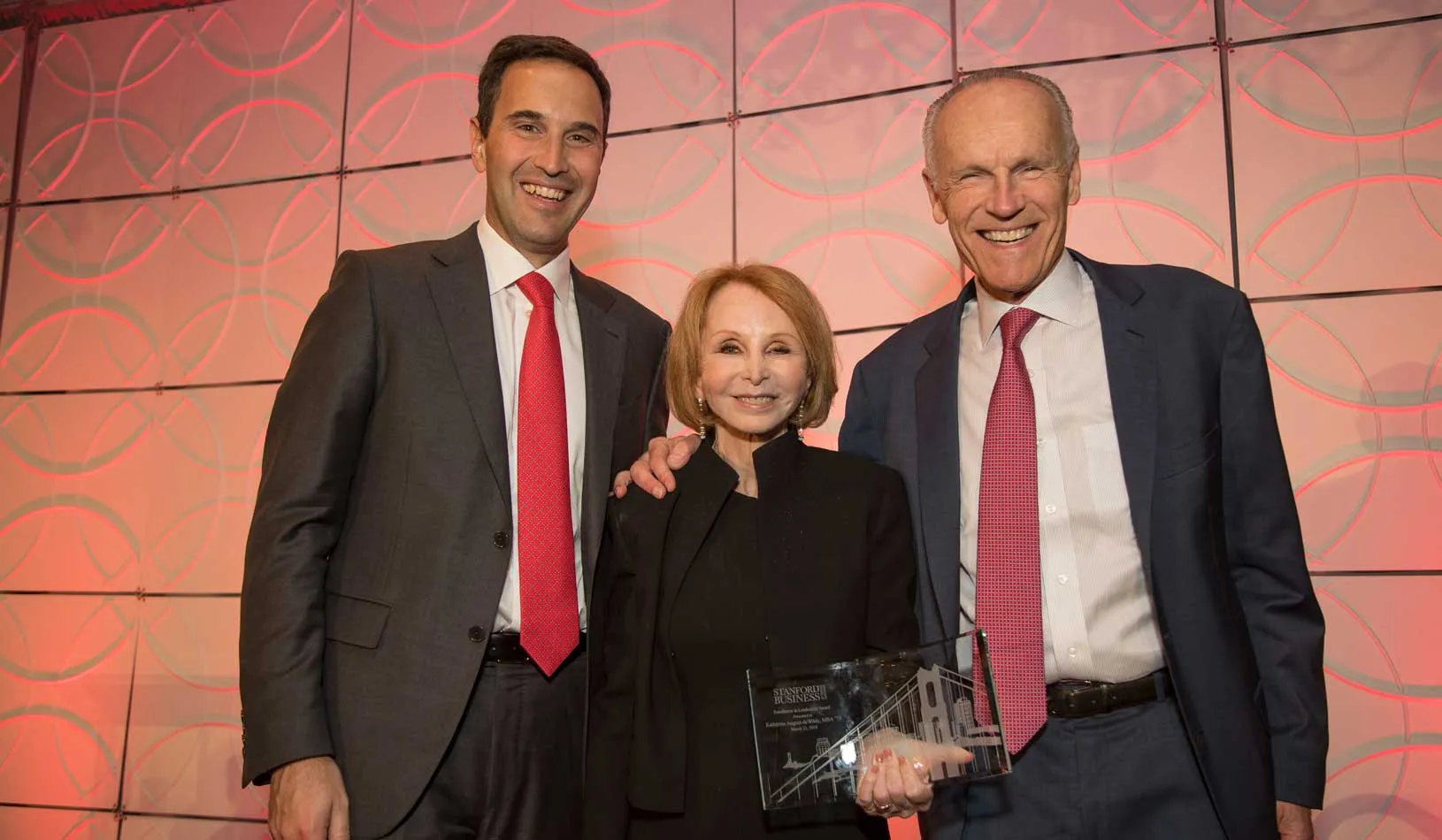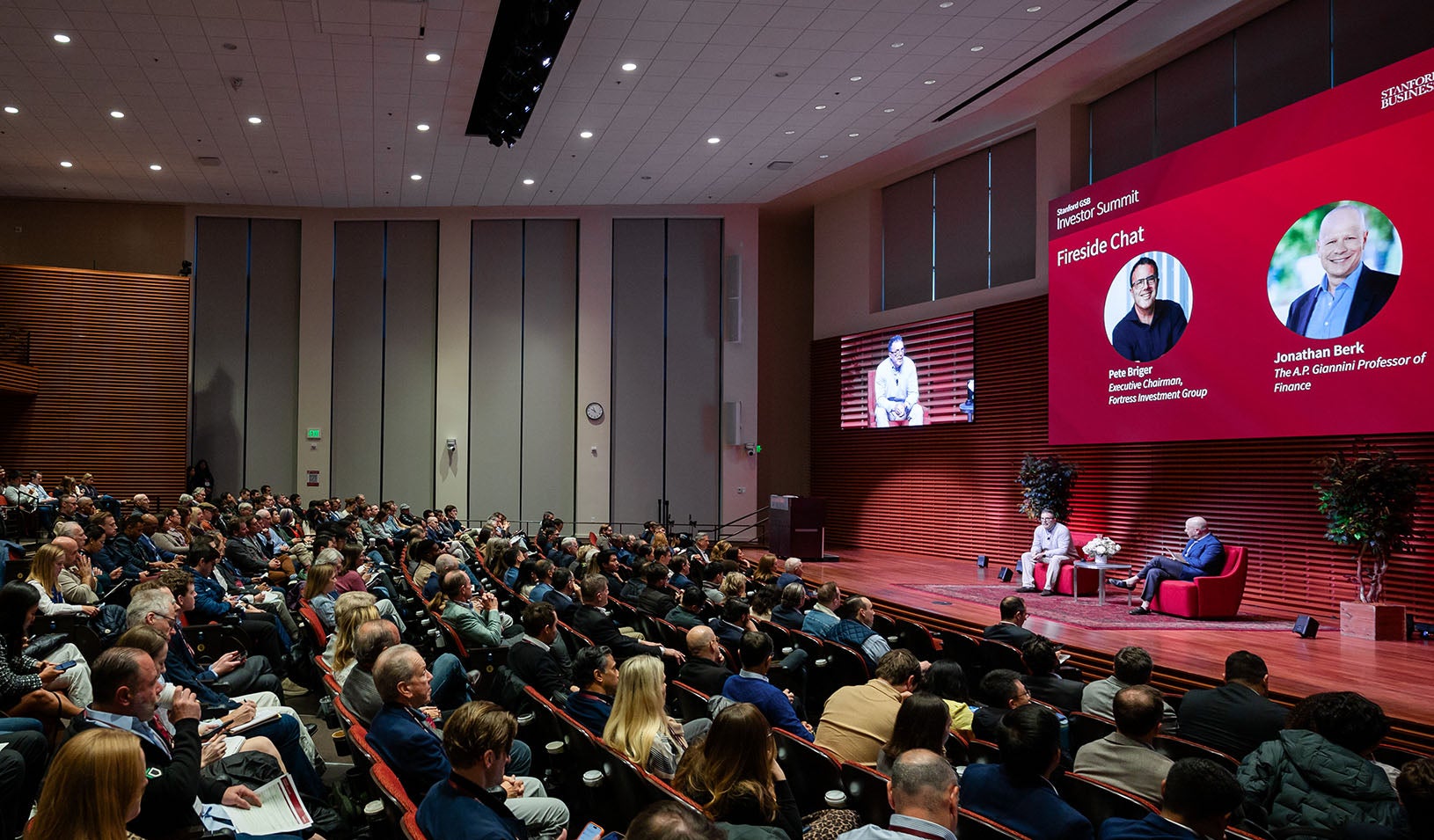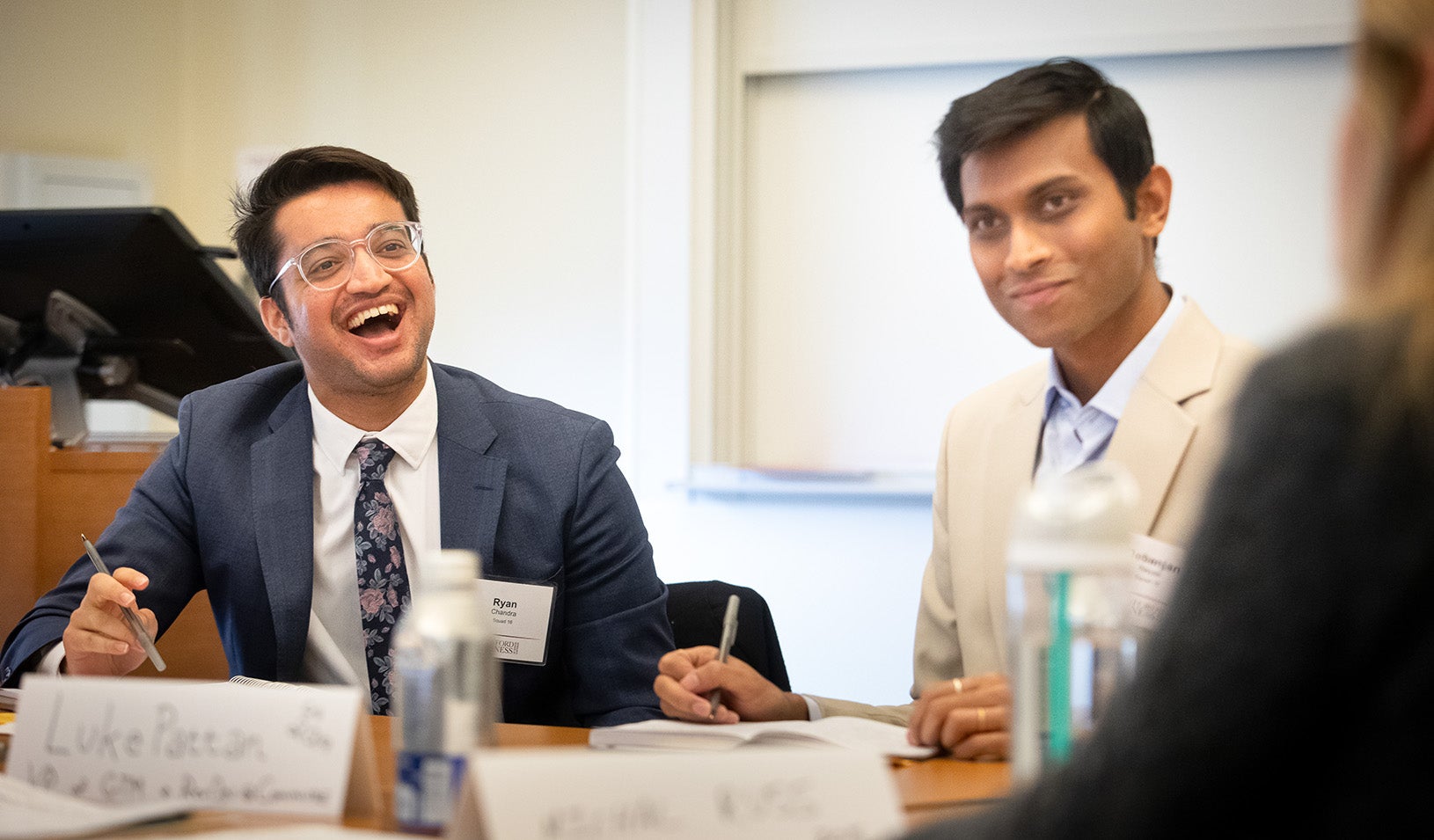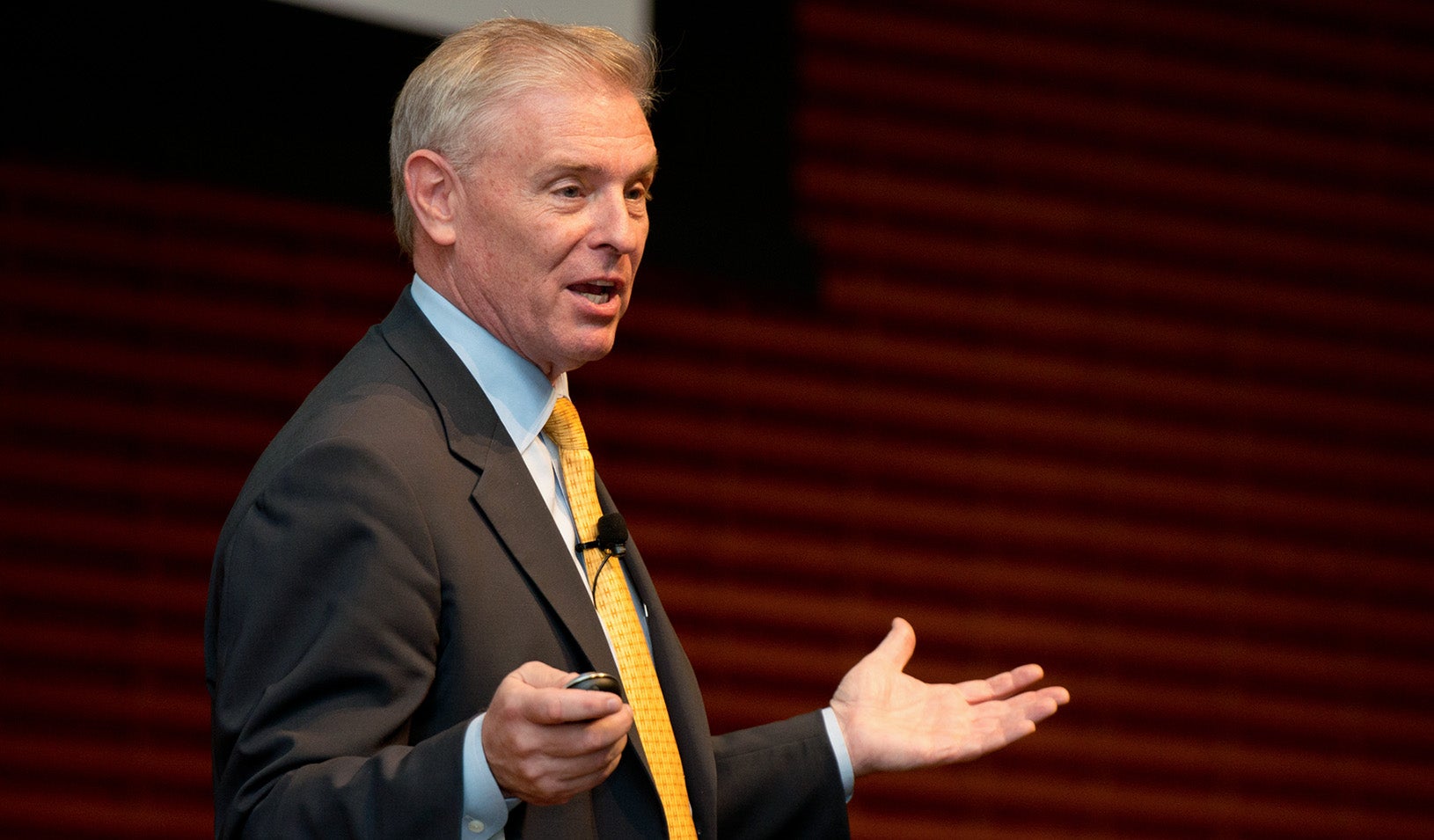April 06, 2018
When former Stanford University board chair Steve Denning, MBA ’78, introduced Katherine August-deWilde, MBA ’75, during a recent dinner honoring her with Stanford GSB’s Excellence in Leadership Award, he mentioned a plaque on her desk that reads: “Make It Happen.”
Excellence in Leadership Award
The annual Excellence in Leadership Award highlights the achievements of a senior executive and Stanford GSB alumnus/a who has made significant contributions to the corporate world and the community.
“She is serious, focused, and determined, driving success through times of crisis and times of opportunity,” Denning said of August-deWilde, who earned her MBA from Stanford GSB in 1975 and was instrumental in the launch of First Republic Bank, where she remains a board member and serves as vice chair. “Much of FRB’s meteoric growth through the years can be attributed to Katherine’s tenacity and relentless drive to ‘make it happen.’ She simply refuses to accept anything but the best from herself and her colleagues, and she expects that level of effort and executional excellence at all times.”
August-deWilde, though, says the words of Henry Wadsworth Longfellow, also displayed on her desk, better explain what’s required of a leader: “The heights by great men reached and kept were not attained by sudden flight, but they, while their companions slept, were toiling upward in the night.”
August-deWilde served as the bank’s president from 2007 to 2015, growing First Republic’s value more than 25 percent per year. Merrill Lynch bought First Republic in 2007 at 3.7 times book value, and three years later she co-led a management buyback from Merrill Lynch’s parent company, Bank of America, at less than book value. Prior to joining First Republic, she was CFO at the PMI Group and a consultant for McKinsey & Company in San Francisco and London.
But her leadership roles weren’t confined to her day jobs. The mother of four has been vice chair of the board of trustees of the Town School for Boys, trustee of the Boys and Girls Clubs of San Francisco, trustee of the Carnegie Foundation for the Advancement of Teaching, and a member of the policy advisory board of the Center for Real Estate and Urban Economics at the University of California, Berkeley. August-deWilde also is a member of the Stanford GSB and Stanford Center on Longevity advisory councils and has been on the board of Stanford’s Clayman Institute for Gender Research. In 2008, she and her husband, David deWilde, also a Stanford GSB alumnus (MS ’84), created the Katherine and David deWilde Faculty/Scholar Fund to support work on entrepreneurship in developing economies.
We sat down with her to ask questions about one of her favorite subjects: leadership.
The phrase “make it happen” suggests you consider persistence a key to leadership.
The first thing you have to have is a strategic vision and the ability to communicate it. You have to know where you’re going and want to lead your team and company. Without that you can’t make the next step. However, persistence is critical. If you persist, it encourages the people you’re leading to persist. You can’t ask more of your team than you ask of yourself.
How do you maintain that level of intensity throughout a career?
You have to love what you do. You have to value the people you work with so they know how important their actions are to you. And you have to set high standards and have that be part of what delights you as you achieve your goals. I’ve always had a lot of intensity; it’s not something I’ve had to work to make happen.
So you were born with it?
I have always been focused on what is important, and my level of intensity increased in graduate school. Stanford inspired me with a vision of what was possible. I wanted to be a role model for others and create opportunities for everyone who worked with me.
Intensity. Persistence. Any other leadership attributes you feel are important?
Being able to say “Let’s,” “Why not?” and “Why can’t we?”
If you could give Stanford MBA prospects one piece of advice, what would that be?
Dream big. And figure out what it takes to make those dreams come true with determination and passion and curiosity, and by teaming up with people who inspire you.

Stanford GSB Dean Jonathan Levin (left) with Katherine August-deWilde, MBA ’75, and Steve Denning, MBA ’78. | Stacy Geiken
Anything you wish you’d known before entering Stanford GSB?
That I should set high goals and expect to achieve them. There’s nothing you can’t do with determination, passion, and talent, and if you’re the kind of leader people will follow. To be that leader also requires humility, a key attribute to success. I’d also want to understand the value of building a network, which is so important to one’s career and one’s happiness.
Did you learn anything during your time at Stanford that you still use today?
I learned that working in teams is essential. Not only did it teach me a lot about leadership, but I learned early on that the best results come from actively engaging everyone on the team. I also learned that there isn’t always one right answer. Several options will work depending on how well you execute.
Are there shortcomings you consistently see that handicap business leaders?
Lack of humility. Not sharing the credit. Not being open-minded. People sometimes fall back on past successes when confronting the future. You need to be open to changes in the world, the economy, and your business. What worked before may work in the future, but it may not.
Any unforgivable sins when it comes to leadership?
People who don’t think they need advice. Strong leaders involve their teams. They have the wisdom and humility to know that not only will decisions be better with input, but input leads to buy-in.
Why has working with the Clayman Institute been such an important part of your life?
It’s always been important to me to help women succeed both professionally and personally. So I have served as a mentor and a coach to help women navigate successful careers and happy families. It is easy to get derailed without role models and mentors.
What leadership qualities do you look for in others?
Vision. Passion. Charisma. Communication. You have to know where you want to go and make people feel great about themselves to join you. It can’t be a solitary journey.
—Martin J. Smith
For media inquiries, visit the Newsroom.



